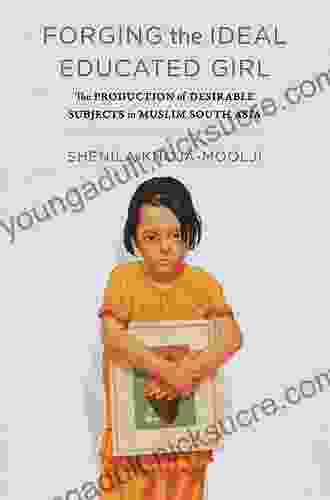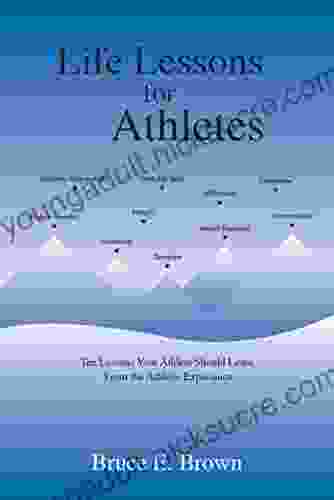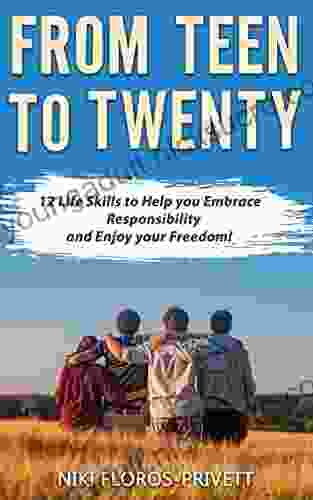The Production of Desirable Subjects in Muslim South Asia: Islamic Humanities and the Formation of Good Muslims

In contemporary Muslim South Asia, the question of how to produce "desirable" subjects has been a central concern of both state and non-state actors. This concern has been particularly pronounced in the wake of the 9/11 attacks and the subsequent "war on terror," which has led to increased scrutiny of Muslim communities around the world. In response to this scrutiny, many Muslim leaders and intellectuals have sought to define what it means to be a "good" Muslim and to promote ways of teaching and learning that will produce such subjects.
One of the most important sites for the production of desirable subjects in Muslim South Asia is the Islamic humanities. These disciplines, which include Islamic studies, Arabic, and Persian literature, have long been seen as essential for the formation of good Muslims. In recent years, however, there has been a growing debate about the role of the Islamic humanities in this process. Some scholars have argued that these disciplines have become too focused on traditional texts and practices and have failed to keep pace with the changing needs of Muslim communities. Others have argued that the Islamic humanities are more important than ever in a world where Muslims are increasingly facing challenges to their faith.
4.6 out of 5
| Language | : | English |
| File size | : | 9714 KB |
| Text-to-Speech | : | Enabled |
| Screen Reader | : | Supported |
| Enhanced typesetting | : | Enabled |
| Word Wise | : | Enabled |
| Print length | : | 218 pages |
| Lending | : | Enabled |
The debate about the role of the Islamic humanities in the production of desirable subjects is a complex one, with no easy answers. However, it is a debate that is of vital importance to the future of Muslim communities in South Asia. In this article, I will explore the different perspectives on this debate and offer some suggestions for how the Islamic humanities can be used to produce desirable subjects in the 21st century.
The Traditional Islamic Humanities
The traditional Islamic humanities are rooted in the Qur'an and the Sunnah, the two primary sources of Islamic law and theology. These disciplines have been taught in Islamic schools and universities for centuries, and they have played a central role in the formation of Muslim identity.
The traditional Islamic humanities typically focus on the study of Arabic grammar, Islamic history, Islamic law, and Islamic theology. These disciplines provide students with a deep understanding of the Islamic faith and its history. They also help students to develop critical thinking skills and a strong sense of morality.
In recent years, however, there has been a growing debate about the relevance of the traditional Islamic humanities in the 21st century. Some scholars have argued that these disciplines have become too focused on traditional texts and practices and have failed to keep pace with the changing needs of Muslim communities. They argue that the traditional Islamic humanities do not adequately address the challenges that Muslims face in the modern world, such as globalization, secularism, and religious pluralism.
The New Islamic Humanities
In response to the criticisms of the traditional Islamic humanities, a number of scholars have called for a "new" Islamic humanities. This new approach to the Islamic humanities would be more focused on contemporary issues and would draw on a wider range of sources, including social sciences, humanities, and natural sciences.
Proponents of the new Islamic humanities argue that this approach would be more relevant to the needs of Muslim communities in the 21st century. They argue that the new Islamic humanities would help Muslims to understand the challenges that they face and to develop strategies for addressing these challenges.
The debate about the future of the Islamic humanities is a complex one, with no easy answers. However, it is a debate that is of vital importance to the future of Muslim communities in South Asia. The Islamic humanities have long played a central role in the formation of Muslim identity, and they will continue to play an important role in the future. However, it is important to ensure that the Islamic humanities are relevant to the needs of Muslim communities in the 21st century. The new Islamic humanities offer one possible way forward, but it is ultimately up to Muslim scholars and educators to decide how the Islamic humanities will evolve in the future.
The Production of Desirable Subjects
The production of desirable subjects is a complex process that involves a variety of factors, including education, socialization, and media. In Muslim South Asia, the Islamic humanities play a significant role in the production of desirable subjects. These disciplines provide students with a deep understanding of the Islamic faith and its history. They also help students to develop critical thinking skills and a strong sense of morality.
However, the Islamic humanities are not the only factor that contributes to the production of desirable subjects. Socialization and media also play important roles. Socialization is the process by which individuals learn the values and norms of their society. Media is a powerful tool that can be used to shape public opinion and to promote certain values and behaviors.
In Muslim South Asia, the media has often been used to promote negative stereotypes of Muslims. These stereotypes have contributed to the production of undesirable subjects, who are often seen as violent, intolerant, and backward.
In order to produce desirable subjects, it is important to counter these negative stereotypes. The Islamic humanities can play a role in this process by providing students with a more accurate understanding of Islam. Media can also be used to promote positive images of Muslims and to challenge negative stereotypes.
The production of desirable subjects is a long-term process, but it is one that is essential for the future of Muslim communities in South Asia. By working together, educators, parents, and media professionals can create a more positive environment for the production of desirable subjects.
The production of desirable subjects is a complex issue that has been the subject of much debate in Muslim South Asia. The Islamic humanities have long played a central role in this process, but there is a growing debate about their relevance in the 21st century. Some scholars have called for a "new" Islamic humanities that would be more focused on contemporary issues and would draw on a wider range of sources.
The debate about the future of the Islamic humanities is a complex one, with no easy answers. However, it is a debate that is of vital importance to the future of Muslim communities in South Asia. The Islamic humanities have long played a central role in the formation of Muslim identity, and they will continue to play an important role in the future. However, it is important to ensure that the Islamic humanities are relevant to the needs of Muslim communities in the 21st century. The new Islamic humanities offer one possible way forward, but it is ultimately up to Muslim scholars and educators to decide how the Islamic humanities will evolve in the future.
4.6 out of 5
| Language | : | English |
| File size | : | 9714 KB |
| Text-to-Speech | : | Enabled |
| Screen Reader | : | Supported |
| Enhanced typesetting | : | Enabled |
| Word Wise | : | Enabled |
| Print length | : | 218 pages |
| Lending | : | Enabled |
Do you want to contribute by writing guest posts on this blog?
Please contact us and send us a resume of previous articles that you have written.
 Fiction
Fiction Non Fiction
Non Fiction Romance
Romance Mystery
Mystery Thriller
Thriller SciFi
SciFi Fantasy
Fantasy Horror
Horror Biography
Biography Selfhelp
Selfhelp Business
Business History
History Classics
Classics Poetry
Poetry Childrens
Childrens Young Adult
Young Adult Educational
Educational Cooking
Cooking Travel
Travel Lifestyle
Lifestyle Spirituality
Spirituality Health
Health Fitness
Fitness Technology
Technology Science
Science Arts
Arts Crafts
Crafts DIY
DIY Gardening
Gardening Petcare
Petcare Ben Bleiweiss
Ben Bleiweiss Jeffrey Lee
Jeffrey Lee Warren Sande
Warren Sande Gerard Siggins
Gerard Siggins Matt Vincent
Matt Vincent Jo May
Jo May Tom Chatfield
Tom Chatfield Patrick M Lencioni
Patrick M Lencioni Massimo Florio
Massimo Florio Mike Chambers
Mike Chambers Jay Matthews
Jay Matthews Robin Yocum
Robin Yocum Violet White
Violet White Jonathan Gottschall
Jonathan Gottschall Elizabeth Kaledin
Elizabeth Kaledin Ron Jeffries
Ron Jeffries Christina Reese
Christina Reese Hourly History
Hourly History Chris Santella
Chris Santella Cynthia Nims
Cynthia Nims Harold S Koplewicz
Harold S Koplewicz Thais Nye Derich
Thais Nye Derich Gillian Price
Gillian Price Pete Dunne
Pete Dunne Angelo Lowery
Angelo Lowery Tim O Connor
Tim O Connor Third Edition Kindle Edition
Third Edition Kindle Edition Richard Lee Byers
Richard Lee Byers Marie Myung Ok Lee
Marie Myung Ok Lee Mark Lester
Mark Lester Dave Duncan
Dave Duncan Howard Davis
Howard Davis David Herres
David Herres Schoolhouse Heaven
Schoolhouse Heaven Ken Dryden
Ken Dryden Warren St John
Warren St John Jennifer Bohnet
Jennifer Bohnet Thomas Golf
Thomas Golf Jeffrey Thurston
Jeffrey Thurston Mark J Musser
Mark J Musser Stephen Lynch
Stephen Lynch Mandee Heller Adler
Mandee Heller Adler Stefan Hunziker
Stefan Hunziker Phil Burt
Phil Burt Jordan Summers
Jordan Summers Karl E Peace
Karl E Peace Mark Verstegen
Mark Verstegen Kevin Hunter
Kevin Hunter Humberto G Garcia
Humberto G Garcia Roger Craig
Roger Craig Judith S Beck
Judith S Beck Kat Anderson
Kat Anderson Bradley T Erford
Bradley T Erford Caryl Say
Caryl Say Beth A Leonard
Beth A Leonard David E Jones
David E Jones Eugene P Northrop
Eugene P Northrop Ruby Lang
Ruby Lang Rodney Paul
Rodney Paul Jenna Blough
Jenna Blough Ryan Beck
Ryan Beck Angel Millar
Angel Millar Dennis Rainey
Dennis Rainey Richard A Muller
Richard A Muller Peter Gibson
Peter Gibson William E Hearn
William E Hearn Linda Sivertsen
Linda Sivertsen Elizabeth Hunter
Elizabeth Hunter Ben Ehrenreich
Ben Ehrenreich R E Burrillo
R E Burrillo Richard Lemaster
Richard Lemaster Nikki Ace
Nikki Ace Stephen Jungmann
Stephen Jungmann Louis Martin
Louis Martin Michele Borba
Michele Borba Joseph Mazur
Joseph Mazur Michael Tomasello
Michael Tomasello Donald N Yates
Donald N Yates Rob Willson
Rob Willson James M Johnston
James M Johnston Rod Powers
Rod Powers Sandra Steingraber
Sandra Steingraber Angelo Chiari
Angelo Chiari Liv Ryan
Liv Ryan John Sonmez
John Sonmez Andy Mitchell
Andy Mitchell Alberta Hawse
Alberta Hawse Scott Turner
Scott Turner Otto Rahn
Otto Rahn Ariel Henley
Ariel Henley Chris Chelios
Chris Chelios Tom Dymond
Tom Dymond Ashley Rickards
Ashley Rickards Lee Cronk
Lee Cronk David Goodman
David Goodman Lynn Lyons
Lynn Lyons Tigran Bagdasaryan
Tigran Bagdasaryan Shane O Mara
Shane O Mara G K Derosa
G K Derosa John Geiger
John Geiger T R Fehrenbach
T R Fehrenbach Lisa Marie Mercer
Lisa Marie Mercer Greg Prato
Greg Prato Leanne Ely
Leanne Ely Jenna Helwig
Jenna Helwig Christina Hillsberg
Christina Hillsberg Ben Campbell
Ben Campbell Andy Tyson
Andy Tyson Rachel Kowert
Rachel Kowert Carlo Rovelli
Carlo Rovelli Richard Hibshman
Richard Hibshman Charney Herst
Charney Herst Kim Dragoner
Kim Dragoner Mometrix
Mometrix Peter Townsend
Peter Townsend Andy Jurinko
Andy Jurinko Bob Swope
Bob Swope Lucy Postgate
Lucy Postgate Andy Peloquin
Andy Peloquin Rebecca Boggs Roberts
Rebecca Boggs Roberts Tiara Mcclure
Tiara Mcclure Emiko Jean
Emiko Jean Tim Thayne
Tim Thayne Sharon Strand Ellison
Sharon Strand Ellison Avinash Navlani
Avinash Navlani Samuel B Green
Samuel B Green Mercedes Pollmeier
Mercedes Pollmeier Arlin Smith
Arlin Smith Scott Meyer
Scott Meyer Catherine Mccord
Catherine Mccord Janet Menzies
Janet Menzies Tovar Cerulli
Tovar Cerulli David Graeber
David Graeber Gregory J Davenport
Gregory J Davenport Richard G Brown
Richard G Brown Judith Hoare
Judith Hoare M J Fievre
M J Fievre Connie Schultz
Connie Schultz Rebecca Hemmings
Rebecca Hemmings J D Swanson
J D Swanson Sylvester Nemes
Sylvester Nemes Viviana Altuve
Viviana Altuve Bob Gordon
Bob Gordon Angela Stancar Johnson
Angela Stancar Johnson Jeff Fleischer
Jeff Fleischer Jessica Jung
Jessica Jung Kevin J Gaston
Kevin J Gaston Kelly Corrigan
Kelly Corrigan T L Payne
T L Payne United States Government Us Army
United States Government Us Army Rafael Gordillo Naranjo
Rafael Gordillo Naranjo Leonard Lueras
Leonard Lueras Richard L Sites
Richard L Sites William Ayers
William Ayers George Noory
George Noory Tirzah Price
Tirzah Price Nicholas Jubber
Nicholas Jubber Seth Lloyd
Seth Lloyd Rebecca P Cohen
Rebecca P Cohen Rosie Daley
Rosie Daley Eric Schmitz
Eric Schmitz Sam Fury
Sam Fury Dave Smith
Dave Smith James Quinn
James Quinn Chef Maggie Chow
Chef Maggie Chow Forrest Maready
Forrest Maready Carol Ann Gillespie
Carol Ann Gillespie Ryan Bow
Ryan Bow Jessica Nordell
Jessica Nordell Rebecca Serle
Rebecca Serle Johnson Egonmwan
Johnson Egonmwan Chanel Craft Tanner
Chanel Craft Tanner William D Lopez
William D Lopez Nick Bradley
Nick Bradley Mark Kernion
Mark Kernion Jules Brown
Jules Brown Elly Molina
Elly Molina Katrina Cope
Katrina Cope Tim Macwelch
Tim Macwelch George Megre
George Megre Joel J Lerner
Joel J Lerner Kathy Freston
Kathy Freston Andy Schell
Andy Schell Adam Skolnick
Adam Skolnick Christopher O Kennon
Christopher O Kennon Nathaniel Rich
Nathaniel Rich Miles Olson
Miles Olson Erin Moulton
Erin Moulton Jerry Toner
Jerry Toner Neil Hawkesford
Neil Hawkesford Rawdon Wyatt
Rawdon Wyatt Israelin Shockness
Israelin Shockness Jon Ronson
Jon Ronson Emma Dalton
Emma Dalton Robert Lindsay
Robert Lindsay Kenneth R Ginsburg
Kenneth R Ginsburg Jeffrey Bernstein
Jeffrey Bernstein Keith Elliot Greenberg
Keith Elliot Greenberg Stephen Rea
Stephen Rea Jay Griffiths
Jay Griffiths Ellen Frank
Ellen Frank Tovah Feldshuh
Tovah Feldshuh Florian Freistetter
Florian Freistetter Andrea Lankford
Andrea Lankford Marie Brennan
Marie Brennan Nicholas Epley
Nicholas Epley L S Boos
L S Boos Dhonielle Clayton
Dhonielle Clayton Mark Shepherd
Mark Shepherd Aaron Wilson
Aaron Wilson Mark Remy
Mark Remy Troy A Hill
Troy A Hill Lisa Preston
Lisa Preston Johnny Molloy
Johnny Molloy W Todd Woodard
W Todd Woodard Angelo Tropea
Angelo Tropea Jorge Ramos Mizael
Jorge Ramos Mizael Kent David Kelly
Kent David Kelly John C Maxwell
John C Maxwell Marilyn Burgos
Marilyn Burgos K Moriyasu
K Moriyasu Bret A Moore
Bret A Moore Richard Bate
Richard Bate Keith Crowley
Keith Crowley Angela Leslee
Angela Leslee Rachel Hutt Phd
Rachel Hutt Phd Angeline Boulley
Angeline Boulley Baby Professor
Baby Professor Robert Kirk
Robert Kirk Serena B Miller
Serena B Miller Jeff Mach
Jeff Mach Frank Deford
Frank Deford Joshua Clark
Joshua Clark Madeleine Roux
Madeleine Roux Dave Gray
Dave Gray Gary B Meisner
Gary B Meisner Stephen Grossberg
Stephen Grossberg Stephen Cheney
Stephen Cheney Stewart Shapiro
Stewart Shapiro Lin Wellford
Lin Wellford Bill Schneider
Bill Schneider Shenila Khoja Moolji
Shenila Khoja Moolji Emily Souder
Emily Souder George Johnson
George Johnson Tim Larkin
Tim Larkin Muako Maepa
Muako Maepa Mark Synnott
Mark Synnott Guy Evans
Guy Evans Germano Dalcielo
Germano Dalcielo Emily Nielson
Emily Nielson Mtg Editorial Board
Mtg Editorial Board Stacy Mccullough
Stacy Mccullough Shreya Ramachandran
Shreya Ramachandran Kathy Hoopmann
Kathy Hoopmann Jeanne Godfrey
Jeanne Godfrey Scott Alan Johnston
Scott Alan Johnston Tea Rozman Clark
Tea Rozman Clark Yuu Tanaka
Yuu Tanaka Afra J Zomorodian
Afra J Zomorodian Cory Mortensen
Cory Mortensen Laura Bogen
Laura Bogen Robert Zubek
Robert Zubek Ron Douglas
Ron Douglas Jim Posewitz
Jim Posewitz Samir P Desai
Samir P Desai John B Nici
John B Nici Rodney Castleden
Rodney Castleden Robyn Wideman
Robyn Wideman Mark W Steege
Mark W Steege Sam Bleakley
Sam Bleakley Patrick Pickens
Patrick Pickens Michael V Uschan
Michael V Uschan Donna Helen Crisp Jd Msn Rn Pmhcns Bc
Donna Helen Crisp Jd Msn Rn Pmhcns Bc Stuart Lawrence
Stuart Lawrence Angelina J Steffort
Angelina J Steffort Jenny Smith
Jenny Smith Joy Williams
Joy Williams Cate Tiernan
Cate Tiernan Miranda Green
Miranda Green Rick Vaive
Rick Vaive Robert E Stake
Robert E Stake Diana Nyad
Diana Nyad Robin Benway
Robin Benway John Samuel Barnett
John Samuel Barnett Robert Dudley
Robert Dudley Dan Heath
Dan Heath Pete Sampras
Pete Sampras Dan Ariely
Dan Ariely Judea Pearl
Judea Pearl Tristan Higbee
Tristan Higbee Madison Lee
Madison Lee Karl Beecher
Karl Beecher Kim Foley Mackinnon
Kim Foley Mackinnon Milton Roth
Milton Roth Stephanie Land
Stephanie Land Kari Marie Norgaard
Kari Marie Norgaard Kevin Thomas
Kevin Thomas Teresa Parker
Teresa Parker Rashaun Johnson
Rashaun Johnson Jamie Kuykendall
Jamie Kuykendall Wynne Foster
Wynne Foster George E Hein
George E Hein Kim West
Kim West Dr Eva Beaulieu
Dr Eva Beaulieu Deborah Wall
Deborah Wall Thomas Gilovich
Thomas Gilovich Margaret M Quinlan
Margaret M Quinlan Jeremy Klaff
Jeremy Klaff Neveen Musa
Neveen Musa Ingrid S Clay
Ingrid S Clay Carlos Acevedo
Carlos Acevedo Robyn Harding
Robyn Harding Hajime Isayama
Hajime Isayama Mark Rosenman
Mark Rosenman Angel Burns
Angel Burns Brian Cain
Brian Cain Shalabh Aggarwal
Shalabh Aggarwal Robin Ray Green
Robin Ray Green Andy Crowe
Andy Crowe Ryan D Agostino
Ryan D Agostino Karen Elliott House
Karen Elliott House Andy Farrell
Andy Farrell Joe Peta
Joe Peta Kristen S Kurland
Kristen S Kurland Christian Wiggins
Christian Wiggins Martin Volken
Martin Volken Dwight E Neuenschwander
Dwight E Neuenschwander Derek M Steinbacher
Derek M Steinbacher Kate Le Roux
Kate Le Roux Walter Beede
Walter Beede Angela Smith
Angela Smith Jane M Healy
Jane M Healy Belinda Norton
Belinda Norton Robyn Ryle
Robyn Ryle Caspar Melville
Caspar Melville Petros Efthymiou
Petros Efthymiou Ed Stafford
Ed Stafford Raynor Winn
Raynor Winn Lois A Ritter
Lois A Ritter Jason Hogan
Jason Hogan Marc Charles
Marc Charles Keylee C Hargis
Keylee C Hargis Peter Finch
Peter Finch Joseph Phillips
Joseph Phillips Mark Wells
Mark Wells Barry Pickthall
Barry Pickthall Latonya J Trotter
Latonya J Trotter Rachel Connelly
Rachel Connelly Alessio Mangoni
Alessio Mangoni Lawrence Goldstone
Lawrence Goldstone Tania N Shah
Tania N Shah Fredrik Backman
Fredrik Backman Michael Anthony
Michael Anthony Angela C Wu
Angela C Wu Dean Beaumont
Dean Beaumont Wendy Rosenoff
Wendy Rosenoff Howell Raines
Howell Raines Murtaza Haider
Murtaza Haider Roland A Boucher
Roland A Boucher Danil Zburivsky
Danil Zburivsky Christopher Nyerges
Christopher Nyerges Bob Clouser
Bob Clouser Rebecca Solnit
Rebecca Solnit Ray Walker
Ray Walker Kyle Graves
Kyle Graves Siena Cherson Siegel
Siena Cherson Siegel Cap N Fatty Goodlander
Cap N Fatty Goodlander Erich Fromm
Erich Fromm Scott Stillman
Scott Stillman Susan Burton
Susan Burton Joan Jacobs Brumberg
Joan Jacobs Brumberg Bradley Charbonneau
Bradley Charbonneau Joe Berardi
Joe Berardi Nicole Smith
Nicole Smith Jessica Wolstenholm
Jessica Wolstenholm Angela Thayer
Angela Thayer Jonah Lehrer
Jonah Lehrer Mirabai Starr
Mirabai Starr Harry Fairhead
Harry Fairhead Margaret Jordan Halter
Margaret Jordan Halter Sir Edmund Hillary
Sir Edmund Hillary Sandy Tolan
Sandy Tolan Jeffrey T Richelson
Jeffrey T Richelson Diana Winston
Diana Winston Mary Pipher
Mary Pipher Eliot Schrefer
Eliot Schrefer Lynn Palm
Lynn Palm Karen Sternheimer
Karen Sternheimer Natalie Rhodes
Natalie Rhodes Robb Manning
Robb Manning Colby Coombs
Colby Coombs Donna Mott
Donna Mott Jim Prime
Jim Prime Alex Wolf
Alex Wolf Lidia Bastianich
Lidia Bastianich Nicholas D Kristof
Nicholas D Kristof Bernd Heinrich
Bernd Heinrich Kristen Jervis Cacka
Kristen Jervis Cacka Jodi Picoult
Jodi Picoult Dawn Griffiths
Dawn Griffiths Tj Faultz
Tj Faultz Chip Heath
Chip Heath Angela Eckhoff
Angela Eckhoff Laura Hillman
Laura Hillman Julia Reed
Julia Reed Cheryl Alkon
Cheryl Alkon Anna Rashbrook
Anna Rashbrook Andy Dowsett
Andy Dowsett Tanya Lee Stone
Tanya Lee Stone Douglas Henderson Jr
Douglas Henderson Jr Robert Urban
Robert Urban Wayne Mcghie
Wayne Mcghie Irene Gut Opdyke
Irene Gut Opdyke Rebecca Eanes
Rebecca Eanes Stefanie K Johnson
Stefanie K Johnson Eli Wilson
Eli Wilson Daniel Friedmann
Daniel Friedmann Mitch Horowitz
Mitch Horowitz Patrick Ejeke
Patrick Ejeke Capn Fatty Goodlander
Capn Fatty Goodlander Paul Cobley
Paul Cobley Tina Nelson
Tina Nelson Andy Puddicombe
Andy Puddicombe Yvonne Choquet Bruhat
Yvonne Choquet Bruhat David C Keehn
David C Keehn Ted Sandling
Ted Sandling Christian Heath
Christian Heath Michael Driscoll
Michael Driscoll Kristina Statler
Kristina Statler S L Macgregor Mathers
S L Macgregor Mathers William Bryant Logan
William Bryant Logan Tim Hannigan
Tim Hannigan Rufus Estes
Rufus Estes Ellen J Langer
Ellen J Langer Daddilife Books
Daddilife Books Frederick Aardema
Frederick Aardema Elizabeth Foss
Elizabeth Foss D M Davis
D M Davis Manik Joshi
Manik Joshi Chuck Weikert
Chuck Weikert Matthew D Dewar
Matthew D Dewar Barak Ariel
Barak Ariel Sabbithry Persad Mba
Sabbithry Persad Mba Devaki Lakshmi
Devaki Lakshmi Lindsay Ford
Lindsay Ford Jodi Shabazz
Jodi Shabazz Tom Allen
Tom Allen Margaret Visser
Margaret Visser Steve Hindman
Steve Hindman Tara Sim
Tara Sim Meg Long
Meg Long Ruth Benedict
Ruth Benedict Ashley P Martin
Ashley P Martin Oliver Burkeman
Oliver Burkeman Kathryn Miles
Kathryn Miles David Kinney
David Kinney Donald R Prothero
Donald R Prothero Charlotte Klaar Phd
Charlotte Klaar Phd Jim Saccomano
Jim Saccomano Lutz Hanseroth
Lutz Hanseroth Joyce Yang
Joyce Yang
Light bulbAdvertise smarter! Our strategic ad space ensures maximum exposure. Reserve your spot today!
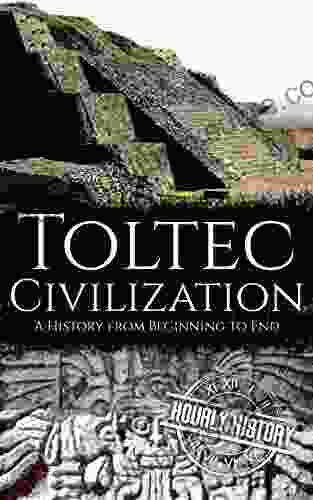
 Connor MitchellAn Expansive Journey Through Mesoamerican History: Unraveling the Tapestry of...
Connor MitchellAn Expansive Journey Through Mesoamerican History: Unraveling the Tapestry of...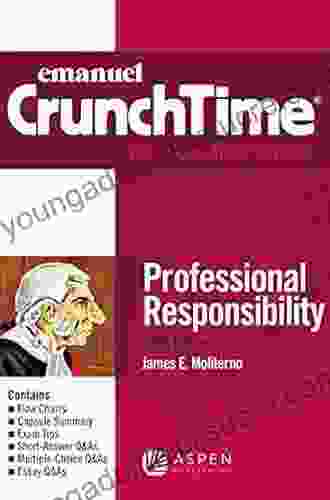
 Banana YoshimotoEmanuel Crunchtime: A Long-Tail Description of Professional Responsibility
Banana YoshimotoEmanuel Crunchtime: A Long-Tail Description of Professional Responsibility J.D. SalingerFollow ·10k
J.D. SalingerFollow ·10k Will WardFollow ·5.8k
Will WardFollow ·5.8k Eddie PowellFollow ·18.2k
Eddie PowellFollow ·18.2k Brandon CoxFollow ·16.6k
Brandon CoxFollow ·16.6k Gabriel BlairFollow ·7k
Gabriel BlairFollow ·7k Vernon BlairFollow ·13.8k
Vernon BlairFollow ·13.8k Galen PowellFollow ·19.8k
Galen PowellFollow ·19.8k Aaron BrooksFollow ·3.2k
Aaron BrooksFollow ·3.2k
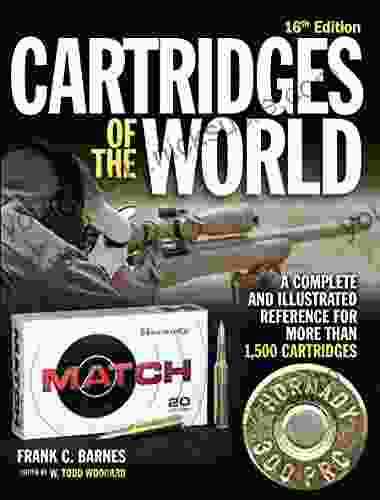
 Devon Mitchell
Devon MitchellDelve into the Comprehensive World of Cartridges: A...
In the realm of firearms, cartridges stand...

 Joseph Conrad
Joseph ConradTales From The San Francisco 49ers Sideline: A Look...
The San Francisco 49ers are one of the most...

 Ervin Bell
Ervin BellArcGIS Desktop 10: A Comprehensive GIS Tutorial for...
Geographic information...

 Reed Mitchell
Reed MitchellPhysiology Pretest Self Assessment And Review 14th...
Accurately gauge your physiology knowledge and...
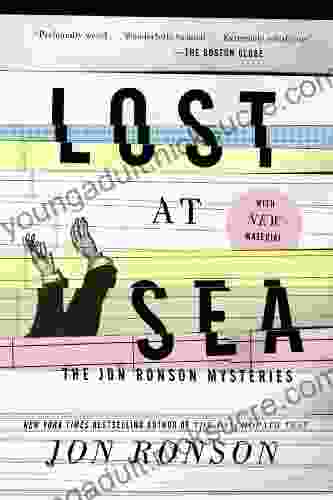
 Devin Ross
Devin RossLost At Sea: The Unbelievable True Story of the Jon...
In 2009, journalist Jon Ronson set out to...
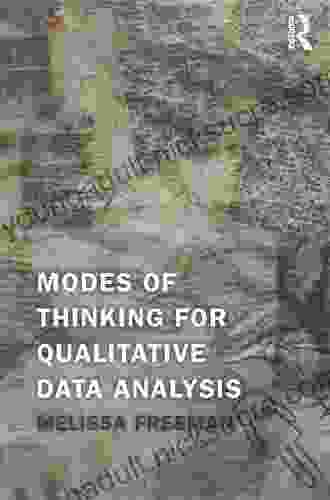
 Shane Blair
Shane BlairModes of Thinking for Qualitative Data Analysis
Qualitative data analysis is a complex...
4.6 out of 5
| Language | : | English |
| File size | : | 9714 KB |
| Text-to-Speech | : | Enabled |
| Screen Reader | : | Supported |
| Enhanced typesetting | : | Enabled |
| Word Wise | : | Enabled |
| Print length | : | 218 pages |
| Lending | : | Enabled |


